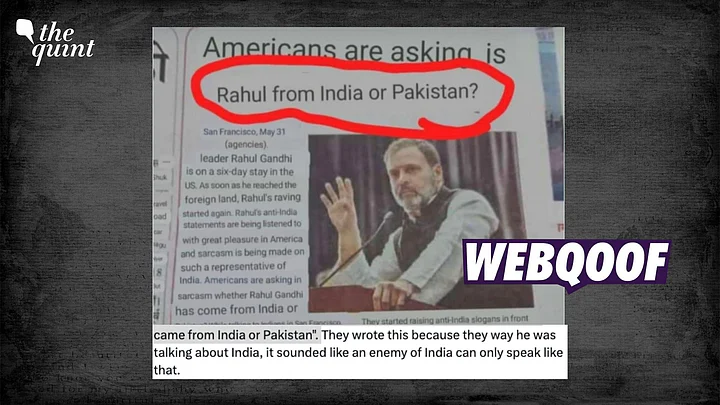The Indian National Congress (INC), once the mighty force that steered India to independence, finds itself today in a desperate bid to regain relevance. For decades, the party that claims the mantle of having single-handedly won India’s freedom has been increasingly sidelined in the nation’s politics. This growing irrelevance, driven by a string of electoral failures and leadership missteps, seems to be pushing the Congress to attempt a comeback by any means necessary—legitimate or otherwise. The party’s narrative of its role in India’s freedom struggle is marred by its refusal to acknowledge the costs of some of its leaders’ decisions. The INC’s insistence on its central role in India’s independence movement often overlooks the disastrous impact of partition, which was, to a great extent, shaped by the power struggles within the party itself. Mohandas Karamchand Gandhi, one of the most prominent leaders of the time, had advocated for the disbandment of the Congress post-independence. He believed that the organization had fulfilled its purpose. Yet, Gandhi’s suggestion was ignored. The refusal to disband, driven by self-interest and the lust for political power, set the stage for a new kind of division—one within the country itself.
At the center of this historical controversy lies the Nehru-Gandhi family, a dynasty that has, for decades, dominated the Congress Party. The party’s attempts to claim the legacy of Dr. B.R. Ambedkar, the revered Dalit leader and architect of the Indian Constitution, are a classic case of political opportunism. Jawaharlal Nehru, India’s first prime minister and the patriarch of the Nehru-Gandhi dynasty, is said to have not only sidelined Dr. Ambedkar but also actively worked to diminish his influence. This manipulation of historical narratives is now coming to light, unravelling long-held myths about the Nehru-Gandhi family’s secular credentials and their supposed dedication to India’s democratic values. Recent revelations have further tarnished the image of this once-revered political dynasty. Jawaharlal Nehru, who projected himself as an orthodox Hindu from the Pandit lineage of Jammu and Kashmir, is now being scrutinized for his true religious identity and his policies that many believe were designed to undermine India’s indigenous Sanatan Dharma traditions. His promotion of distorted history through state-sponsored education policies has raised significant concerns. Nehru’s legacy was continued by his descendants, including Indira Gandhi and Rajiv Gandhi, whose tenure saw further erosion of India’s cultural and educational fabric. Today, the legacy is carried forward by Rahul Gandhi, often derisively referred to as the “uncrowned prince” of the Congress party. Rahul Gandhi’s frequent blunders, lack of understanding of the country’s pulse, and continuous criticism of India on foreign soil have only added to his party’s woes. His recent escapades in the United States, where he sought to garner support by maligning his homeland, have not gone unnoticed. His remarks against India’s democratic processes and its leadership have irked not only Indian nationals but also a significant section of the American political and intellectual community.

The desperation is palpable. Failing to mobilize support domestically, Rahul Gandhi and his Congress party seem to be seeking external allies, including foreign powers that are not particularly friendly toward India. Allegations of Congress leaders aligning with separatist forces like the Khalistan movement, or even reaching out to international terror organizations, are deeply troubling. While such claims might seem far-fetched to some, they reflect a growing perception that the Congress is willing to go to any lengths to regain power. Interestingly, even Americans—often perceived as indifferent to the nuances of Indian politics—are beginning to take note. Reports in sections of the American media have begun to call out Rahul Gandhi’s questionable tactics and narratives. The same Western audience, which once consumed the Nehruvian version of Indian history and politics without question, is now waking up to the alternative perspectives that have been suppressed for decades. The idea that a leader of the opposition from the world’s largest democracy is actively campaigning against his country on foreign soil does not sit well with many, even in the United States. It goes against the very grain of democratic decorum and national integrity. Rahul Gandhi’s missteps may have unintended consequences. If there’s anything the recent backlash in American circles signifies, it’s that the Congress’s strategies are increasingly falling flat, not just at home but abroad as well. The INC’s reliance on outdated narratives and falsehoods is proving to be its Achilles’ heel. India today is a resurgent nation, a fast-growing economy that is challenging global superpowers. In such a scenario, aligning with forces that wish to see a weakened India only exposes the Congress’s desperation and political bankruptcy. As Rahul Gandhi continues his global tours, peddling outdated and divisive rhetoric, one thing becomes clear: the Congress Party’s strategy is not just flawed; it is perilous. For India’s sake and its own, the Congress must introspect and reform. The path to revival lies not in aligning with external forces against the country’s interests but in reconnecting with the very people it claims to represent. The American realization of Rahul Gandhi’s true intentions should serve as a wake-up call for the Congress—if it truly cares about India’s future, it must first come to terms with its past.





